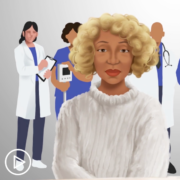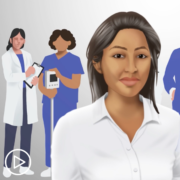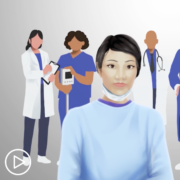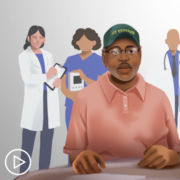How Can Extensive Stage Small Cell Lung Cancer Symptoms Be Managed?
How Can Extensive Stage Small Cell Lung Cancer Symptoms Be Managed? from Patient Empowerment Network on Vimeo.
When extensive stage small cell lung cancer patients experience symptoms, how can they be managed? Expert Beth Sandy from Abramson Cancer Center discusses collaborative symptom management for ES-SCLC patients for common symptoms including respiratory issues, appetite and digestion, and neurologic symptoms.
See More from [ACT]IVATED Small Cell Lung Cancer (SCLC)
Related Resources:

|

|

|
Transcript:
Lisa Hatfield:
Beth, how do you approach collaborative symptom management for newly diagnosed patients with extensive stage small cell lung cancer?
Beth Sandy:
So when you’re newly diagnosed, it really depends. A lot of our patients will end up having symptoms such as shortness of breath or a cough or even coughing up of blood just because the natural biology of small cell lung cancer tends to be a very centralized cancer, the airways. So symptoms typically are respiratory, and we have a lot of really good treatments to help with things like shortness of breath and cough. To be honest with you, this type of lung cancer is so responsive to chemotherapy that sometimes the chemotherapy alone will help your symptoms because it responds so quickly.
If that’s not the case, we can do radiation also to help minimize the cancer where it may be causing shortness of breath, or certainly if you’re coughing up blood, a lot of times we’re going to go in and do something like radiation. There are other things that we can prescribe such as inhalers or medications that are prescriptions that can help with cough like certain syrups and other pills that can help reduce cough. Those typically are often the main respiratory symptoms. Other things that we may find are things like weight loss and decreased appetite. That can be harder, I will say.
There used to be medications that we used for appetite stimulation. The problem with some of those medications is they were increasing the risk of blood clot, which is already a risk when you have lung cancer, so we don’t have to use them as often. But there are some medications that we can work with, and we work with oncology nutrition a lot as well to help patients, especially when weight loss is an issue. There’s a whole other set of side effects the patient’s going to have once they start treatment, but they usually don’t typically present with things like nausea or vomiting, or constipation or diarrhea. Those things can be side effects of treatment.
Another thing that can be common in extensive stage small cell lung cancer is metastasis to the brain. So sometimes patients will have headaches or neurologic changes, but the good thing is that’s very responsive to steroids and radiation, so the sooner we get people on treatment, really those symptoms tend to improve very quickly. The activation tip for this really would be to make sure you let the nurses and doctors know exactly what sometimes you’re experiencing, because we really do have a lot of good supportive care medications, and truthfully the treatment for the cancer should really help improve your symptoms pretty quickly with this disease.
Share Your Feedback:
Create your own user feedback survey







